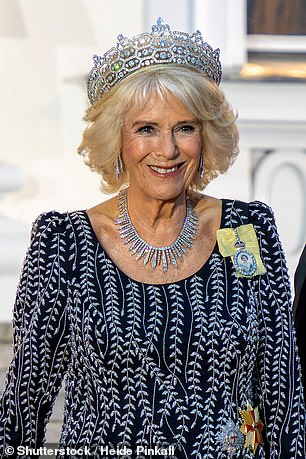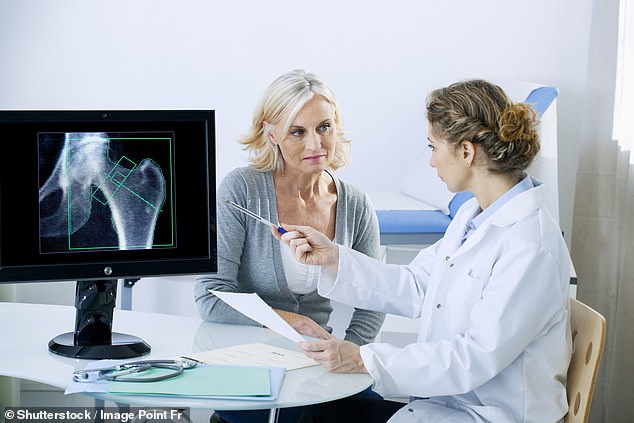
British business is backing the Mail’s campaign for Jeremy Hunt to end the post code lottery in diagnosing a devastating bone disease affecting millions of women.
Business in the Community (BITC), whose founding patron is King Charles, is one of the leading corporate groups to put its weight behind our campaign for the Chancellor to provide funds across the UK for early diagnosis.

Support: Queen Camilla campaigned for years to raise awareness of osteoporosis – a condition which affected her mother
Queen Camilla was for many years a tireless campaigner to raise awareness of osteoporosis after her mother died in 1994 as a result of the disease.
Her Majesty has previously spoken of the ‘horror’ of seeing her mother, the Honourable Rosalind Shand, die a ‘crippling, slow and agonising death’ from osteoporosis, where bones lose density and sufferers are more vulnerable to fractures.
Mary Macleod, Chief Executive of BITC, whose members include FTSE 100 giants such as Marks & Spencer, Legal & General and BP, said: ‘Early diagnosis of health conditions such as osteoporosis, alongside support from employers, can enable more people to remain in the workforce longer and advance in their careers.’
Companies who have signed up as members of BITC employ around 7million people or more than a fifth of the UK workforce.
The Mail on Sunday wants the Chancellor to provide funding for Fracture Liaison Services in every NHS Trust in England and Wales.
These offer an assessment for osteoporosis and a scan to anyone over 50 who turns up at A&E with a low-impact fracture, for instance from a fall from standing height.
They therefore identify the disease early and can prevent painful and life-shortening fractures.
Early diagnosis could keep women in the workforce
The British Chamber of Commerce, the country’s leading business organisation, said the campaign is ‘important’ and ‘relevant’ because employers are suffering staff shortages with ‘over one million open job vacancies.’
‘Early diagnosis will no doubt help get those affected back into work’, a spokesman said.
The group, led by Director General Shevaun Haviland, is a network of 50,000 businesses with six million staff.
One of the UK’s largest trades unions also lined up behind the campaign.

Diagnose early: The Mail’s campaign wants the Chancellor to provide funding for Fracture Liaison Services in every NHS Trust in England and Wales
Wendy Bartlam, Head of Corporate Services at the GMB Union, which has 500,000 members, said:
‘GMB supports the campaign so that workers with osteoporosis can get the healthcare they deserve.’
Corporate Britain is being hit by high levels of ‘economic inactivity’ in the UK, which experts warn is harming the economy.
Some nine million people do not appear on the jobless registers but have dropped out of the workforce, many of them due to health problems including osteoporosis.
Fracture liaison services are present in 57 countries worldwide but in England and Wales they are only available in around half of NHS trusts.
They are offered across the whole of Northern Ireland and Scotland.
The Royal Osteoporosis Society estimates it will cost £30m a year to extend them throughout the UK.
I wholeheartedly support the campaign. Retail, especially, relies on the tireless contribution of women and older colleagues
Helen Dickinson, Chief Executive of the British Retail Consortium
It argues this outlay would rapidly pay for itself in savings to the NHS on the cost of fractures in terms of hospital beds, emergency treatment and long term care for broken limbs.
More support came from Helen Dickinson, Chief Executive of the British Retail Consortium.
It represents 200 major store chains including Sainsbury’s, Tesco and Boots, where many employees are female.
‘I wholeheartedly support the campaign. Retail, especially, relies on the tireless contribution of women and older colleagues,’ she said.
‘An early diagnosis for osteoporosis can mean the difference between a life of chronic pain, and early treatment for a longer, happier life.’
Kate Nicholls, Chief Executive of UK Hospitality, the association for more than 750 companies in the leisure industry, added: ‘The health and wellbeing of our staff is so important. and that’s why we support the campaign.
‘Its call for every NHS Trust to have early diagnosis services for people living with osteoporosis would benefit thousands of over-50s and allow them to continue their lives and careers uninterrupted.’

Kate Nicholls, Chief Executive of UK Hospitality, says early diagnosis for people living with osteoporosis would benefit thousands of over-50s, allowing them to continue their careers
Craig Beaumont, Chief of External Affairs at the Federation of Small Businesses, representing 200,000 firms, said: ‘Since COVID we have seen economic inactivity spike in those over 50 reporting long-term sickness.’
He added that the government should be working with osteoporosis campaigners and the NHS to ‘help people recover and take their rightful place in our economy and society’.
The Chartered Institute of Personnel and Development also backs the campaign, as does Mumsnet, along with politicians from all three major parties in both the Lords and the Commons.
This is an economic no-brainer, just as much as a medical one
Craig Jones, Chief Executive, Royal Osteoporosis Society
Osteoporosis is the fourth most harmful health condition in terms of disability and premature death in the UK, only surpassed by coronary heart disease, dementia and lung cancer.
Calculations by experts at the Royal Osteoporosis Society show that a modest annual investment of £30million to extend Fracture Liaison Services would more than pay for itself, leading to an overall benefit of £440million in the first five years.
Craig Jones, chief executive of the society, said that with universal early diagnosis, ‘people’s first fracture can be their last. This is an economic no-brainer, just as much as a medical one.’
He added that rolling out fracture liaison services across England and Wales could prevent up to 750,000 out of 2.6m sick days caused by fractures every year.
Some links in this article may be affiliate links. If you click on them we may earn a small commission. That helps us fund This Is Money, and keep it free to use. We do not write articles to promote products. We do not allow any commercial relationship to affect our editorial independence.



